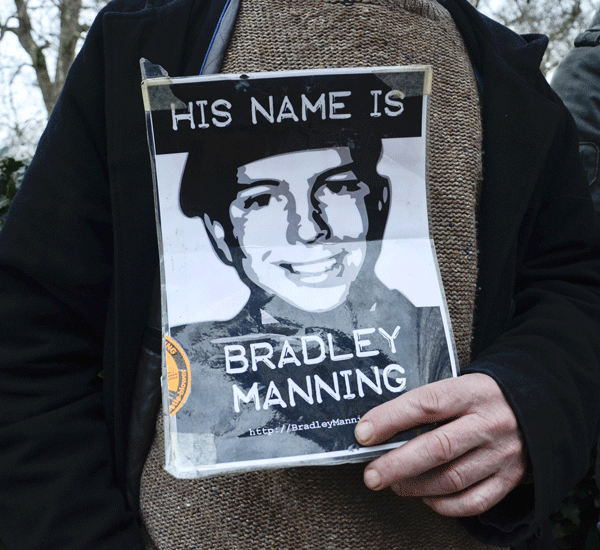In its punitive treatment of accused leaker Bradley Manning, the US government has missed an opportunity to live up to its values of freedom, says Heather Brooke

Manning’s court hearing will begin on 16 December
After nearly 18 months’ incarceration and punitive treatment described as “torture” by human rights activists, accused leaker and former US Army intelligence analyst Bradley Manning will finally get a day in court.
This is not a trial, but an “Article 32” hearing, the US military equivalent to a civilian pre-trial hearing, where the defence can evaluate the government’s case and obtain facts through pre-trial discovery. It begins on 16 December at Fort Meade, Maryland and is expected to run right through the weekend for approximately five days. Despite press interest, only a small number of seats are available for the public and reporting restrictions are in place to prevent live coverage.
Saturday will mark Manning’s 24th birthday, the second birthday he has spent in custody since his arrest in May 2010 for allegedly leaking a US Army video that showed soldiers gunning down Iraqis, including two Reuters journalists. He was later charged with 22 violations of military law for allegedly leaking records and transmitting defence information. He faces life in prison if convicted. The hearing will determine whether or not he goes ahead for a full court-martial.
The length of time Manning has been in pre-trial confinement is controversial, but more so has been his treatment while confined — seeming more like punishment than justice. While in the military brig in Quantico, Virginia he was in maximum custody and controversially placed on prevention of injury (POI) watch, which meant he was in solitary confinement, forced to spend 23 hours in a cell six feet wide and twelve feet in length.
His lawyer David Coombs reported Manning was woken at 5am weekdays and 7am on weekends and was not allowed to sleep any time between then and 8pm. If he attempted to sleep during those hours, he was made to sit up or stand by the guards. Guards checked on him every five minutes by asking him if he was okay. He had to surrender his clothes at night apart from boxer shorts. He was not allowed a pillow or sheets, nor any personal items in his cell, and was prevented from exercising apart from one hour when he would walk in a figure of eight motion.
The harsh conditions were denounced by human rights groups, including Amnesty International, and brought the attention of the United Nations’ rapporteur on torture Juan Mendez, who tried to visit Manning but was refused a private and confidential meeting with the prisoner. More than 50 members of the European Parliament signed a letter to the US government expressing their concern over the whistleblower’s treatment in custody, and 250 American legal scholars signed a letter to President Obama protesting that Manning’s “degrading and inhumane conditions” were illegal, unconstitutional and could even amount to torture.
It was the sort of treatment one might expect from third-world or despotic countries, not the supposed leader of the free world purporting to set an example on human rights. Even the former State Department spokesman PJ Crowley broke ranks and said the treatment was “ridiculous, counterproductive and stupid”.
Following these worldwide criticisms, Manning was moved to a facility in Fort Leavenworth, Kansas, where his conditions were said to be better. The US military conducted an internal investigation into the alleged mistreatment at Quantico and found he had been improperly placed on “prevention of injury” watch against the recommendations of qualified medical personnel. However, the prison official implicated by the report was able to overturn it.
Manning’s “guilt” so far has been based on chat logs of dubious prominence: conversations he allegedly had with hacker Adrian Lamo between 21-25 May. In these logs he”‘confesses” to leaking the video and US Army records of the wars in Iraq and Afghanistan, 260,000 State Department cables and personal files of Guantanamo prisoners to whistleblowing site Wikileaks. The logs also provide a motive: not spying or stealing for material gain, but a desire to educate the world’s citizens about what governments do in their name.
Manning’s story reads like a betrayal by all sides. Not just by those he thought he could confide in but by a government supposedly committed to human rights.
By its punitive pre-trial treatment of Manning and the extra-judicial attempts to shut down Wikileaks, the US Government has renounced the moral highground. It had a unique opportunity to show by action rather than rhetoric how best to practice due process, the rule of law, human rights and freedom of expression. How sadly it has failed to live up to the values it preaches.
Heather Brooke is a writer, journalist, and activist. Her campaign for the full disclosure of MPs’ expenses led to a full-scale reform of the Parliamentary expense system. Her latest book is The Revolution Will Be Digitised. She is on Twitter – @newsbrooke




